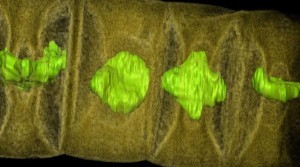Swedish scientists have uncovered 1.6 billion-year-old fossils that indicate multi-cellular life developed much earlier than previously thought — possibly 400 million years earlier.
Therese Sallstedt of the Department of Palaeobiology at the Swedish Museum of Natural History was examining fossilized, layered mats of cyanobacteria collected in an ancient rock outcrop in central India when she came across what appear to be primitive algae fossils.
Cyanobacteria are basic, single-cell life forms that have existed for nearly 3.5 billion years and are among the oldest fossils known.
“I was studying the mat biota, expecting to find more variations of bacteria,” Sallstedt said in an email. She didn’t expect to find well-preserved fossilized algae, which was much bigger and more complex than the surrounding bacteria. She became “very excited.”
more at: seeker.com
Ask me anything
Explore related questions





